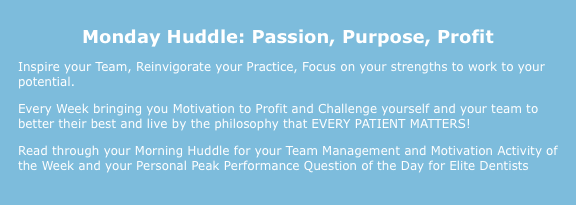Let’s hit the ground running this week with maybe my favorite thing to work on. This is probably the biggest reason why patient values and percentage of acceptance stays so small on full mouth plans (or worse than that – you never get to full mouth plans).
If you stay problem-focused instead of health-focused or smile or whatever you consider your clinical philosophy and desired outcome for your patients – focused.
You end up with this next sabotaging issues and it permeates the entire practice.
Case Acceptance Destroyer and Sabotage Trait #2 of 5…
The Doctor’s vocabulary and verbiage when closing treatment and delivering diagnosis. And it doesn’t stop at the doctor, although they are usually the ones who put their foot in their mouths often without even knowing it.
I’m going to keep this simple because Doctors, your team members will be happy to help you and give you a list of all the things you say that destroy the patients’ excitement and commitment to proceed.
Here are the basics…
A) Never give permission to delay. Patients do not hear the entire explanation, they only hear “okay to delay.” They don’t hear about what, why or which part; they just hear that’s it not important enough to do right now because you gave them permission to wait.
Eliminate “wait”, “delay”, “not as important”, “not necessary”, “not essential”, “don’t have to” – and anything else that gives patients permission to not move forward.
They will try hard to not move forward by themselves THEY DO NOT NEED YOUR HELP on this matter.
B) Also, you want to avoid talking about things like “elective care” or anything that makes patients feel something is optional. We want optimal not optional. Big difference and you need to be definitive about it.
C) Help the patients think long term. If a tooth needs a crown and the patient ask if a crown is necessary and you say “well we could just do a composite for now.” This is short term thinking and truly cost more money, time and health in the future. I’ve heard it before, I know someone will do this and then turn to me to complain about how many composites you are still having to do. If you don’t help the patients understand the long term health benefit (or consequence), it’s your fault; no one else’s and certainly not the patients.
D) Another one… never apologize for patients problems or for your diagnosis. Most doctors are very bashful about this. Patients can feel that and it comes across as you are either uncertain or insecure. Therefore, they believe the treatment may not in fact be that important or necessary.
The entire stereotype about “dentists just want to make money from me” exists because doctors are not more confident about talking to patients regarding their true health and related treatment.
Please discuss all of these and others with your team.
Never ever forget: it is not about how you think or what you mean or even the way you say things – your intentions do not matter in patient conversations – ONLY patients’ perceptions and perspectives of what they think you mean based on what you say matters.
You must assess every word and every action through the eyes of the patient and then see just how well you are doing to be influential, decisive and compelling. You are and need to be a real leader and authority in the care you provide and suggest.
Team members, all the same goes for you.
Like we talked about a couple weeks ago… if the patient doesn’t feel some sense of urgency and importance of doing this now, saying yes today, moving forward with treatment as soon as possible – then they won’t.
And it all comes down to verbiage and how you talk with them.
Next week we pick up on this and tie it together with the actual treatment planning. In the meantime, get to work on this sabotage trait.



